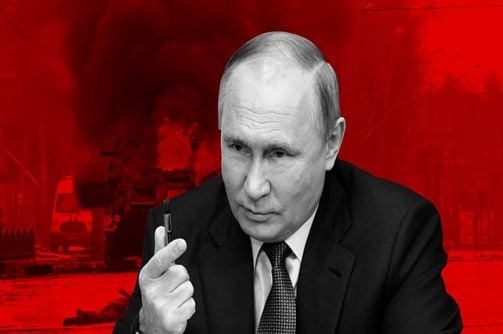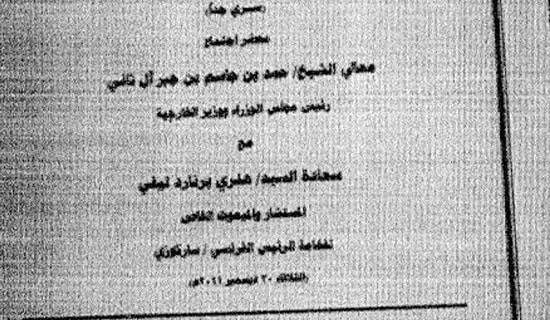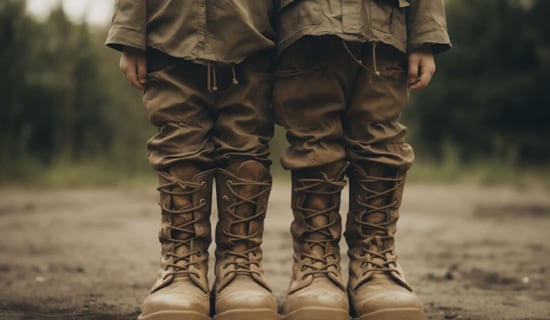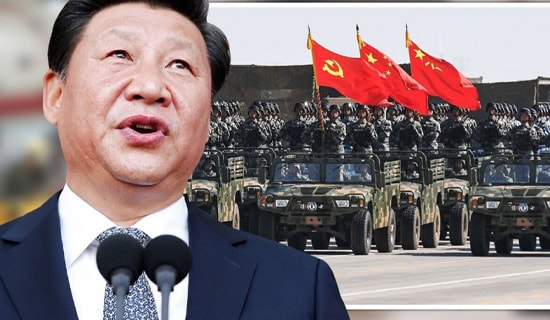After Russia launched the so-called "Special Military Operation" (SMO) against Ukraine on February 24, many Western media outlets started to write that Russian President Vladimir Putin lives in a reality of his own. It follows that to analyze what is happening in Ukraine, it is important to understand this reality that Putin perceives as reflected in his rhetoric.
On more than one occasion, the Russian leadership stated that the SMO's official goal is the protection of the Donbass region from the Ukrainian "Nazi" regime in Kyiv. However, it is becoming obvious that it is neither the safety of Donbass nor the Ukrainian "Nazi regime" that Putin cares about. The real enemy that Putin wants to defeat is the West, which for him is represented first and foremost by the United States. He sometimes refers to the "Kyiv regime" as an enemy as well, albeit with the caveat that it is under Washington's control. After all, Ukraine is too small of an enemy for him.

The "Righteous" War
Putin wants to break the U.S.-dominated "unipolar world order." He views the West as guilty for "claiming its exceptionalism," particularly after the collapse of the Soviet Union. On May 9, which in Russia is celebrated as Victory Day, Putin clearly stated that the unipolar order is a threat that is "denigrating" the entire world. [1]
According to Putin, the U.S. is obsessed with "finishing off" and "destroying" Russia.[2] He believes that the West's main goal is to "dismember" Russia, and reduce it to "a weak and dependent country" with no territorial integrity.[3] In order to do so, Putin claims that Washington would resort to any means: from "eastward expansion of NATO," to backing "neo-Nazis and Banderites,"[4] and pushing for "bloodshed."
While drawing the image of the "hostile" West, Putin becomes surprisingly emotional, using a row of offensive adjectives to describe the shortcomings of the opponent. According to Putin, the West is: "irresponsible," "arrogant," with "low cultural standards," "cynical," "deceptive," "a liar," "hypocritical," "insolent," "morally degraded," a supporter of "false values," "a con-artist," "abusive," "conceited," "condescending," "disdainful," "in a state of euphoria created by the feeling of absolute superiority," "contemptuous," etc. [5]
Such an abundance of adjectives is not typical of Putin's usually rather dry rhetoric, thus revealing a personal resentment and bitterness toward the West that he sees as a collective entity in which the U.S. controls EU countries (sometimes referred to as America's "junior companions"[6] or "junior comrades/tovarishi"[7]).
For him, the West's policy can be described as "a kind of modern absolutism," going against all "universally recognized norms of morality and ethics," and based on "rough, direct force." Paraphrasing the Cold War terminology, Putin says that a veritable "Empire of Lies" has been created inside the United States in recent years. Substantially stating that the West is nothing but "lies and hypocrisy all around."[8]
Putin also describes the West as a warmonger. According to him, wherever the United States brought its "law and order," it created "bloody, non-healing wounds and the curse of international terrorism and extremism,"[9] while "the whole planet has to pay for the West's ambitions and the West's attempts to maintain its elusive dominance by any means possible."[10]
In contrast, Putin presents Russia as "patient," "respectful," "open," "honest," "peaceful," and "responsible." According to Putin, Russia does not intend to "impose anything on anyone by force," as "real strength," "justice" and "truth" are on its side.[11] Hence, Russia is portrayed as a victim of injustice. According to Putin, the West wants to "cancel" Russia and achieve "global dominance,"[12] and in order to do so it will not allow Russia to play a global role and to recognize Russia's "right" over "its historical lands."
Hence, according to Putin's logic, the return to Russia of "its historical lands," primarily Ukraine, will restore historical justice. Accordingly, the war he is now waging is being defines as "righteous [pravednii],"[13] as its goal is to build a new and "just" world order. Ultimately, Russia is fighting not only for itself, but for the salvation of the rest of the world.[14]
SUPPORT OUR WORK

Putin also emphasizes that the West wants to "finish off and destroy" an "honest" Russia, simply for being "a big independent country."[15] Within the framework of such a narrative, war is perceived as something natural and inevitable.
According to Putin, Russia is not to be blamed for anything, it is the West that seeks to destroy it simply for being itself. Hence, there is nothing left for Russia but to "defend" itself. This argumentation resonates very much with the popular Russian myths that Russia has been chosen to accomplish an important mission.[16]
Conclusion
Does Putin really believe what he says, or is it just rhetoric? Obviously, the protection of Donbass and the denazification of Ukraine are merely propaganda narratives for internal use, designed to ensure the loyalty of Russian citizens. Ukraine is not a goal in itself. It matters only as Russia's demonstration of power and independence from American pressure. Putin wants to show that he can defy the "empire of lies," and do what he wants, even if it has a big price tag. In addition, the "war with the West" gives Putin at least an illusory sense of returning to the days of the Soviet Union, the loss of which, apparently, he regrets so much.
*Dr. Olesya Zakharova is a Russian political scientist.
[1] En.kremlin.ru/events/president/transcripts/68366, May 9, 2022.
[2] Kremlin.ru/events/president/transcripts/speeches/67843, February 24, 2022.
[3] Kremlin.ru/events/president/news/67996, March 16, 2022.
[4] "Banderites" is a term for Members of the Organization of Ukrainian Nationalists (OUN), which formed in 1929 in a merging of various groups including the Union of Ukrainian Fascists, The term comes from the name of Stepan Bandera, who was head of the OUN.
[5] Kremlin.ru/events/president/transcripts/speeches/67843, February 24, 2022.
[6] Kremlin.ru/events/president/transcripts/68366, May 9, 2022.
[7] Mid.ru/ru/foreign_policy/news/1813377/?lang=en, May 14, 2022.
[8] Kremlin.ru/events/president/transcripts/speeches/67843, February 24, 2022.
[9] Kremlin.ru/events/president/transcripts/speeches/67843, February 24, 2022.
[10]Kremlin.ru/events/president/news/67996, March 16, 2022.
[11] Kremlin.ru/events/president/transcripts/speeches/67843, February 24, 2022.
[12] Kremlin.ru/events/president/news/67996, March 16, 2022.
[13] En.kremlin.ru/events/president/transcripts/68366, May 9, 2022.
[14] Kremlin.ru/events/president/transcripts/speeches/67843, February 24, 2022.
[15] Kremlin.ru/events/president/transcripts/67828, February 21, 2022.
[16] Kremlin.ru/events/president/transcripts/67828, February 21, 2022.




